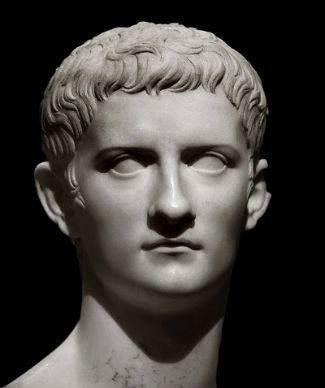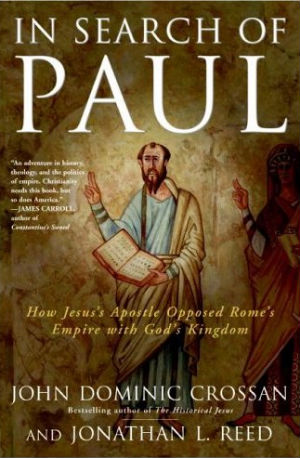 Emperor Caligula (37-41 AD). Caligula lived when Paul was converted. This ruler was clearly insane, making his horse Consul of Rome, finally assassinated.
Emperor Caligula (37-41 AD). Caligula lived when Paul was converted. This ruler was clearly insane, making his horse Consul of Rome, finally assassinated.by Neil Earle
2013 will not go down as the worst year on record – no BP oil spills or Japanese nuclear-tinged tsunamis. Not as many loose cannon talk show hosts as in previous years, perhaps. No dreaded total financial collapse of the Western economies.
But – oh yes – it definitely had its moments.
More school shootings, sad and pathetic photos of little children lying dead after poison gas attacks in Syria, consistent ongoing bombings in Iraq, Afghanistan, Libya and Egypt. Tastes oscillated widely. There was Miley Cyrus ingloriously strutting her stuff and Michelle Obama’s bangs – not enough, however, to distract attention from a government shutdown in D.C.
Meanwhile the overcrowded prison population depriving little kids of their parents for “mandatory minimum” sentences for non-violent crime even drew the ire of thoughtful conservatives such as George Will (Memphis Commercial Appeal, December 26, 2013, page 6A). This “sledgehammer justice” affects even three nice little kids in our congregation being raised by their over-worked grandmother.
Not a wipe-out of a year, but not a great one either. As 2014 begins, we have to wonder: Is there anywhere to look for a new future? A better future? Theodore H. White ended his The Making of the President, 1960 with the thought that the world looks to the White House for “miracles.” But that was the early 1960s; much water has gone under the bridge since then, not all of it clean. Nowadays most American seem to have lost their optimism for the future even if they would want to live nowhere else. Which leads us back to an update of the old saying, “All roads lead to Rome.” For Christians it reads more like “All roads lead to Romans.”
There is good news out there but you have to set aside some prejudices and presuppositions to get to it.
The Book of Romans is the Gospel according to Paul, the First Century’s greatest proclaimer of the Good News. This was the exciting proclamation that began at Bethlehem – that the Prince of Peace had come and things would be different.
In Romans 1-3 Paul sketches a world that looks very much like the one we see about us today. Take a look. You’ll be shocked. It is a world like ours, one that had fallen under the condemnation of what Paul calls “the law of sin and death.” Sin and death seems to make up a fair part of our nightly news these days. And even the Jewish nation which had received the precious gift of the Law at the hands of God himself had too often used it as a tool of self-exaltation and exclusivism (Romans 2:24).
 Emperor Caligula (37-41 AD). Caligula lived when Paul was converted. This ruler was clearly insane, making his horse Consul of Rome, finally assassinated.
Emperor Caligula (37-41 AD). Caligula lived when Paul was converted. This ruler was clearly insane, making his horse Consul of Rome, finally assassinated.By the time Paul wrote, the old Law-based system from Moses’ time was breaking down. The Jewish leadership in Jerusalem had turned into money-changers and high-living collaborators with the Roman power. This was a bad match-up. Ten of the first Roman emperors were bisexual. Some, like Caligula and Nero, were clearly insane. Against this moral and spiritual futility Paul harped upon a great theme. He called it “the righteousness of God apart from Law – a righteousness given to us by faith” (Romans 3:21).
Consistently in his teaching, Paul stressed that the Sinless One who gave the Law is also the One who has rescued and redeemed us from the Law of Sin and Death (Romans 5:21). Rejoice for the Law Giver is also the Defense Attorney. We can escape the hammer and tongs of this tired old system, Paul taught. And for the “law and order” minded First Century Romans this did not mean a “no fault/no pay” theology. Getting us off the treadmill involved a titanic atoning sacrifice – the death of God’s Son on the cross to pay for the sins of the world.
But Christ’s death was the prelude to an even greater event – Jesus’ triumphant resurrection from the dead and ascension to heaven where he received the kingly rule of this entire Universe (Colossians 2:13-15). This means something great – Christians have a Friend in high places. John wrote powerfully of the One sent from God who came that we might have life, and have it more abundantly (John 10:10).
This was Paul’s good news for a sin-soaked Romans Empire where slavery was rife, infants were abandoned in the Forum overnight and people were lucky to live to reach age 40. When Christianity began to move out into this educated, stunningly sophisticated Greek and Roman world writhing in unrighteousness, it had to confront the cynical, pagan spirit of the times. Jesus raised up Paul, an educated and zealous former rabbi, to do just that.
 The Good News was as unbelieveable in Paul's day as in ours.
The Good News was as unbelieveable in Paul's day as in ours.Paul never missed an opportunity to teach what God was ding with and through the human race (Ephesians 5:15-21). He bore a message form the Creator of the universe to the blinded, struggling sinners here below who were still nevertheless his beloved offspring (Acts 17:26-28). With great compassion and shrewd depth of insight Paul hammered out six key themes that took his audiences from the chance of an individual reconciliation with God to a future remaking and reordering of the entire Cosmos. The Gospel is thus concerned with the biggest themes we can imagine – a project worthy of the Great God.
It goes something like this:
Sometimes Christians forget what Bible translator C.H. Dodd once said, that “Preaching the Gospel is the public proclamation of Christianity to the non-Christian world.” Matthew, Mark and Luke gave a stirring call to action – “Repent, the Kingdom of God has drawn near.”
God is not naïve. For the New Creation to ultimately take effect it will violently involve an intervention by God himself into the present order of things (1 Corinthians 15: 24-25). But the future? Oh yes, the future will be infinitely better than the past for the mouth of the Lord has spoken it.
One of Paul’s interpreters J. Christian Beker said it well: “The abiding center of Paul’s Gospel is that the death and resurrection of Christ have opened up a new future for the world.” The power that raised Christ to the highest heaven will yet be used to reorder this dangerous world system (Ephesians 1:19-23). Now there’s something we can use as our guiding star in 2014…and every year afterwards.